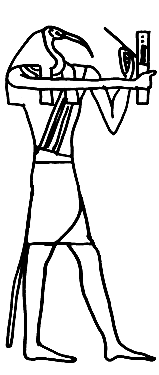
The god of wisdom and of writing, who also functions as a moon god. He is usually depicted as a man with the head of an ibis, often holding a scribe's palette and a pen in his hands, and on his head the two phases of the moon, the crescent and the full moon. He is sometimes depicted entirely with the body of an ibis. There are also many depictions of the god as a baboon. There are various stories about his origins. In Memphis he was considered to be the tongue of Ptah. Elsewhere he is called the son of Osiris or of other gods, including the sun god Re, whose deputy he is as the moon god. Elsewhere again is stated that the moon disk, located on Thoth's head, comes from the head of Seth; analogous to this, Thoth is called the son of Horus, born of Seth. As an ibis he could also have come forth from an egg. Thoth had numerous duties, almost all to do with his wisdom. Sometimes he writes the names of the king on the leaves of a tree (the persea). Related to this is his role as the determiner at birth of a child's fate and the number of years it will live. In addition, he controlled the course of the stars and was lord of time who differentiated the seasons, months and years (related to the moon), he controlled the correctness and promptness of offerings, was the leader of all rituals, functioned as interpreter, etc. His role in the judgement of the dead was also important. In representations in the Book of the Dead, where the heart is being weighed against the goddess Maat, Thoth is the one who notes down the result of the judgement. His most important cult centre was the town 'Khemenu' (later Hermopolis), probably from as early as the Old Kingdom but certainly from the Middle Kingdom on, but there is not much left of his temple now. Only two huge baboons, erected by Amenhotep III, are still there. The god was worshipped in many other places, as demonstrated by the many ibis cemeteries scattered throughout Egypt. From the New Kingdom on, the goddess Nehemet-away appears as his companion, and in the Graeco-Roman Period she is even called his wife; together with their child Hornefer they form a triad. In the Ptolemaic Period Thoth was associated with Hermes, which resulted in the name of Hermopolis.